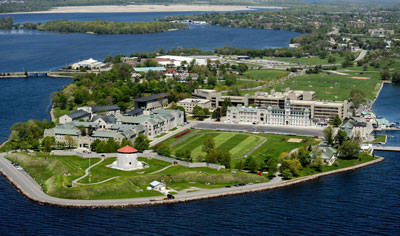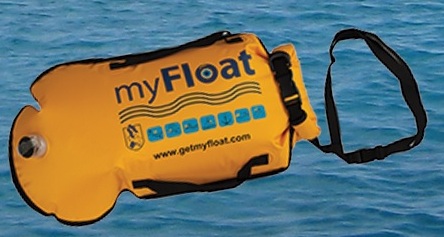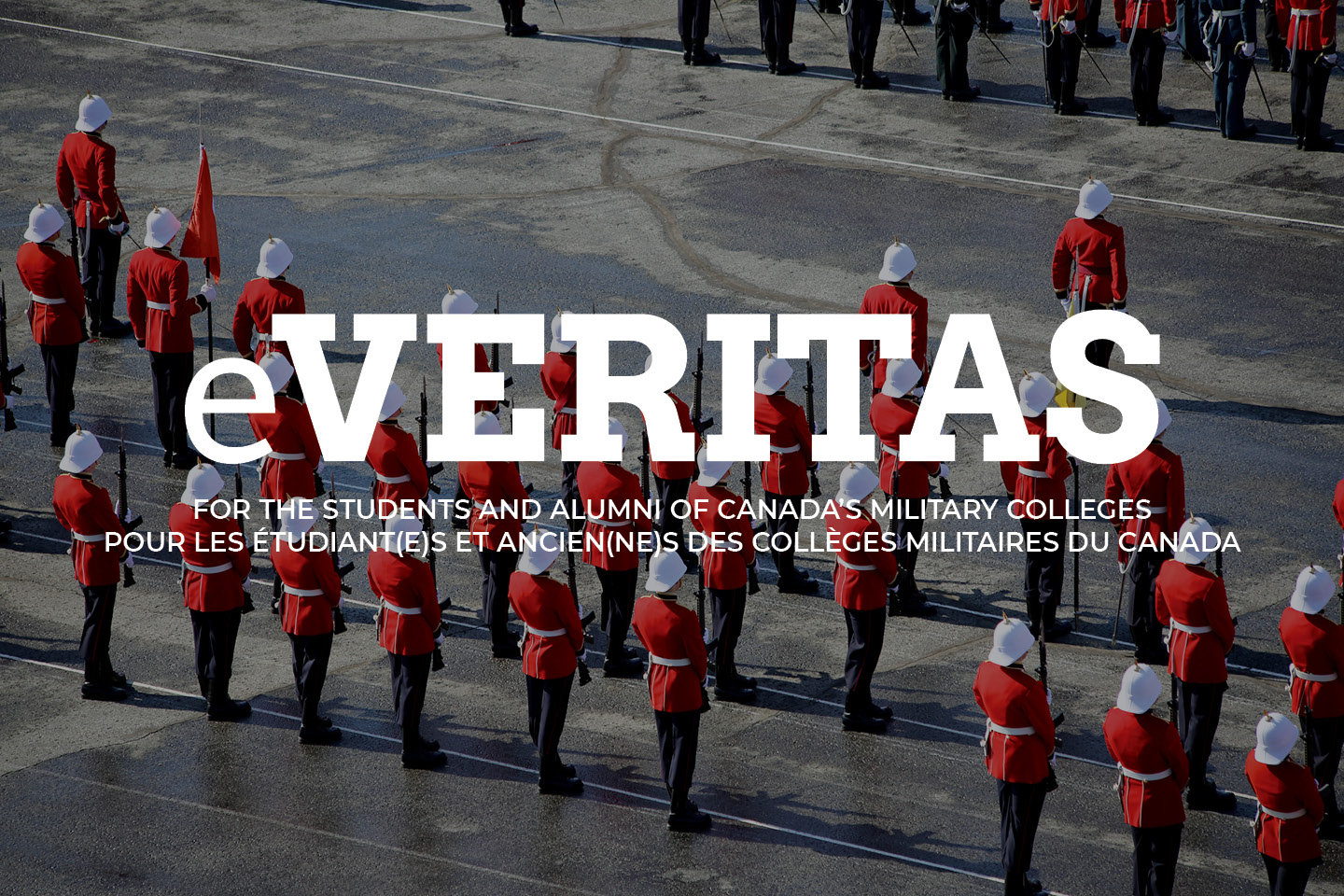
After rising to the top of her athletic craft, 17324 Sharon Donnelly strives for success in the business world
By CLAUDE SCILLEY
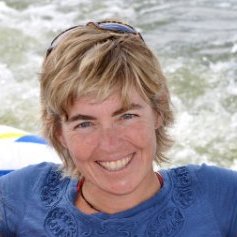 The stars didn’t always align for Sharon Donnelly.
The stars didn’t always align for Sharon Donnelly.
At the recruiting centre, she picked the wrong branch of service. When she arrived at Royal Military College, she picked the wrong course of study. As an athletic pursuit, she wanted to try fencing but wound up a cross-country runner. She wound up in the college band, playing music she didn’t really care for.
By the end of her time at RMC, the engineering student bound for the navy was studying business on a path to army logistics. The cross-country runner, who never did make it to the fencing parlour, was playing water polo. The clarinetist was a highland dancer.
Clearly, Donnelly had a zest for campus life and an eye for new opportunities. It’s perhaps no wonder, then, that when the fates one day did conspire in her favour, she recognized the occasion for its potential—and a world-class triathlete soon came to be, one who would land at the Olympics twice, once as an athlete and again eight years later as a coach.
“I was just doing triathlon because it was fun,” Donnelly recalled of her early days of triathlon, nurtured by a loosely knit group of cadets at RMC. “You go there with a bunch of people. It was a good atmosphere.”
It was the late 1980s and triathlon, the event that combines swimming, cycling and running, was in its infancy, a hybrid recreational event that was just beginning to be contested competitively. By late 1994, however, triathlon had come of age; it got its legitimacy when it was named a full medal sport for the 2000 Olympics.
Donnelly had stayed active in the sport and it just so happened that her mandatory military hitch was coming to an end around that time. While she was wondering what to do with her military career, the Forces were in reduction mode, and they were wondering what to do with Donnelly. “I was doing fairly well in triathlon with inconsistent training,” she recalled. “I was (thinking), ‘If I can do pretty well with inconsistent training, with consistent training, I was curious (how well I could do).
“I’d competed at Olympic trials as a swimmer and thought, ‘What if I try for this? I don’t really want to pass up the opportunity to at least try.’ The timing was right. I’d get a little bit of a severance package and it would give me the boost to get onto the circuit and the first couple of years of racing.”
Her boyfriend—now husband—Dave Rudnicki, was an air force officer. As an army officer, Donnelly knew they would seldom, if ever, be posted together. They decided she would leave the Forces and try for a spot in the first Olympic women’s triathlon.
In 1995, Donnelly developed a five-year plan to reach Sydney that included a trip to the first World Cup race, held that year in Japan. “I contacted the head of the (national) organization to see if there was any help available to get there,” she said. “He said, ‘No, but if you come out and prove yourself, we’ll see from there.’ I came seventh in my first World Cup and the president comes up to me and he says, ‘OK, welcome aboard.’
“That gave me affirmation. I was seventh against the best in the world and I’m, like, ‘Wow. I think this might be the right choice I made.’”
At that race, Donnelly discovered the best triathletes were Australians, so she decided that’s where she would go to train. Every year, for three months prior to the start of the World Cup season in March, Donnelly would train on a beach Down Under. She was still working part-time and still affiliated with a reserve unit in Ottawa but with the 1999 Pan American Games approaching, she quit everything, “cold turkey,” to be an athlete.
Despite her success, and the prospect of an Olympic berth in her future, it was a difficult adjustment. “I had a hard time with that defining me, with people coming up to me and saying, ‘What are you doing?’ and I’d say, ‘I’m an athlete.’ It’s just not a viable occupation.”
It wasn’t until her husband was posted to Kingston at the end of 1999 that Donnelly began to feel comfortable in an athlete’s skin. “By that point I had come to terms with being an athlete, so I was slowly able to unwind from working to a different kind of lifestyle.”
She won the Pan Am triathlon in Winnipeg that year, gaining an Olympic berth for Canada with her time and claiming that spot for herself with her victory.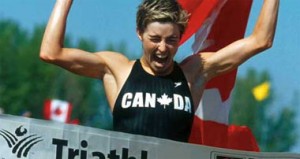
A three-time Canadian champion, Donnelly was ranked ninth when she arrived in Sydney for the first Olympic triathlon but she was part of a multi-bike crash in the cycling segment. Though bloodied, she carried her bike to where she could get its bent front wheel replaced, then resumed racing, ultimately finishing 38th in the 50-woman field.
“A little bit of a mishap on the bike,” is how Donnelly describes it today, with a laugh that belies the unspeakable disappointment you’d think would accompany such bad fortune.
“It happens,” she says, 14 years later almost to the day. “You look back, especially the next day, when they changed the course for the men because of the mistakes they made (designing) the women’s course. You can’t do anything about it and you know what? It’s just sport. No one’s shooting at me, no one’s trying to hurt me. It’s just sport. You test yourself, physically and mentally, and what’s the worst thing that happens? You finish the race, or you finish last, or you win the race. Big deal. You win so very few times. Where do you learn, and how do you get to those (victories)? It’s all those other times.”
Donnelly offers her own experience as proof of the hypothesis.
“If you ask me about the Pan Am Games race, I don’t remember any of it. Nothing. I remember one point on the run course, because I had gone over in my head what to do at that stage prior to the race; I remember my race plan and how I executed it. Other races, where something doesn’t really go right, you just replay it and replay it and replay it, which is good, because hopefully that won’t ever happen again.
“You do remember the stuff that goes right, but (only with respect) to the race plan. That race plan worked. It’s the same as in the military. You plan for everything and one of those plans is going to work. If something does go wrong, you’ve made all the necessary plans to (overcome) it.”
Unlike many cadets who land at RMC, there was no military background in Donnelly’s family.
“It was Grade 12 (Ontario still had Grade 13 at the time) and my mother had seen an article in one of the Toronto papers talking about RMC. At that time, the second or third class of women was going through. It was pretty new at that point, so it made news. She said, ‘Here’s something interesting for you.’ She left it at that.
“Reading the article, it looked like an incredible challenge. I was a top swimmer at that point, competing at national and international championships and really dedicated to swimming, so I was no stranger to discipline. I felt that I could do this. I could learn the military stuff. I felt this was something that would challenge me and I thought I could do well at it. It was a good fit; it kind of ticked off all the boxes.
“Then when they called me in the spring I’m, like, ‘Uh-oh, this is for real. I’ve got to go to Chilliwack.’”
Donnelly readily admits she didn’t know much about what she was getting into. “When I first entered the recruiting centre, they asked what branch of the service do you want? I’m, like, I don’t know. They go, ‘There’s green uniforms for army, there’s blue for air force and there’s black and white for navy,’ so I entered as air force. The uniforms were great.”
She applied to study engineering, “but to tell you the truth I knew nothing about it.”
“(In high school), nobody told us what engineering was. I never even heard of it, but it sounded really cool. By Christmas (I realized), ‘This is not me.’”
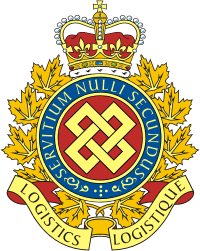 As Donnelly cast about for something else to pursue, the Forces found something for her. “They looked down the road to see what they needed and they said, ‘You have army logistics available.’ I said OK, and I really loved it.”
As Donnelly cast about for something else to pursue, the Forces found something for her. “They looked down the road to see what they needed and they said, ‘You have army logistics available.’ I said OK, and I really loved it.”
Long before Donnelly got her academic future sorted out, the college set about establishing her varsity athletic career path. “I didn’t have much of a choice,” she said. She was the first female cadet across the finish line after the freshman fitness test. “Of course, the cross-country coach, Dick Hartnett, was standing there. He said ‘I want you at cross-country practice tonight.’ I said, ‘I don’t like running. I signed up for fencing.’”
After enough cajoling from fellow cadets, however, Donnelly finally succumbed to the pressure. “I didn’t really like the training much,” she recalled. “I had a really hard time that first year. I’d get lost on warmups. I did like the racing, though. Whether I swam or ran, the racing was different.”
As soon as cross-country season was done, so was Donnelly, until she realized that of all the athletic endeavors at the college, running kept you the fittest. “So I signed up again,” she said. “I started to open my mind and thought, ‘OK, I’ll gradually try to improve the training part of it to improve the running.’”
She was drawn back to the pool, however, when the college started a women’s water polo team in her third year. Meanwhile, she was also in the band and on the debating team. “I was kind of bored with marching tunes because I’d studied music at a pretty high level in high school so I thought, ‘OK, I’ll do highland dancing, I’ll learn something new.’ I guess I was starting to get addicted to fitness. You could get fit and dance at the same time and participate in all those activities that you do as part of the RMC band.”
Triathlon came about almost by accident. Some cadets started a club as a recreational pursuit, “and I thought that looks pretty cool.” Donnelly happened to be at summer training at Borden that summer with one of those triathlon club members and one day he suggested she should register for a triathlon one weekend in Niagara. “I had a car and he was looking for a ride,” she said, “but like anyone who does a triathlon, you do one and you’re hooked.
“I fell in love with it right off the bat.”
It was 1988. “It’s funny. I went up to the registration ladies at the desk and said, ‘Excuse me, where’s the change room? Where do we change after the swim before we get on the bike?’ and they said, ‘We’ll introduce you to this lady.’ I didn’t know who she was. She ended up being the national champion and she was so helpful. She said, ‘No, you wear your bathing suit the whole way,’ and I though, ‘Oh, god that’s gross.’”
Grossed out or not, Donnelly finished second in her age group. “I think I won a pair of free shorts and that was the thing: I won something. That was really cool.’”
Speaking on the phone from Orleans, in the east end of Ottawa, Donnelly recalls her time at RMC with a level of enthusiasm that suggests she enjoyed herself. Asked if that’s the case, there’s a pause.
“There’s always that ‘but,’” she said, with a chuckle. “It was tough. It took me a couple of years to recover from the demands. For me, academically, because I chose to do so many things, it was a really tough time; looking back I’d still say it was one of the toughest things I’ve ever done, because I wanted to take it all in, as much as I could.
“I really focused on swimming as a kid, and put aside the high school life, the social life, so when I got to RMC, it’s such a social atmosphere, I just soaked it in. I scraped by, academically. I wasn’t the highest achiever but I gained so much more in my people skills, which is very important. I worked on my communication and leadership skills, things that a just-academic institution might not be able to do.”
After Sydney, Donnelly continued to race competitively. She was fifth at the Commonwealth Games in Manchester in 2002—countrywoman Carol Montgomery won the race—and that same year she was in the top 10 at the world championship. She narrowly missed gaining a berth on the Canadian team for the 2004 Olympics.
Two years later, the celestial paths crossed over Donnelly once more. He husband was posted to Colorado Springs, which just happened to be the site of the U.S. national training centre for triathlon. It also just so happened the fellow running the centre, Cliff English, was married to Samantha McGlone, the woman who beat Donnelly out of the 2004 Olympic berth. It didn’t take long for English to offer Donnelly a job as a resident coach, in charge of logistics for visiting athletes coming to train at the centre.
By 2008 Donnelly was an assistant coach with the American team. As the Beijing Games approached, the head coach was released. “They said, ‘OK, Sharon. You’re in charge,’” and she was off to China as head coach of the U.S. triathlon team. The top American male finished seventh in the race where Kingston’s Simon Whitfield, a one-time training partner of Donnelly, won the silver medal. American Laura Bennett finished fourth in the women’s race.
“It was an incredible experience,” Donnelly said. “It was interesting to go as a foreign coach, and stand on the other side of the fence, as a coach, not an athlete.
“I felt so proud of my team. At the opening ceremony, when the U.S. team came in, it was the same joy as when Canada walked in, because that was the team I was working with. People thought it was bizarre, as a Canadian, but no, because they were my athletes. I wanted them to win.”
Donnelly and her family moved back to Ottawa in 2009. She did some coaching, started a kids triathlon program in east Ottawa and considered some sports-related administrative jobs, but they didn’t offer the kind of flexibility that would allow her to spend time with her children.
Gemma, soon turning nine, was born in Kingston, an hour after Donnelly completed the Terry Fox Run on the base
“I walked it,” Donnelly said, “and I’ll never forget going up to (base commander) Col. Aitken and going, ‘You know what, sir, I’m not feeling very well. I’m going to go back home and take a rest.’ I had no idea I was in labour.”
Gemma was born five years to the day, to the hour, to the minute that Donnelly finished her race in Sydney. Her son, Evan, was born in 2007 while Donnelly and her husband were in Colorado Springs.
Of late, Donnelly has been busy promoting My Float, an open-water swim bag she co-invented with an Ottawa boating enthusiast and caterer, Met Yurtcu. Touted on the product’s web site (getmyfloat.com) it’s described as “an inflatable dry bag for beach swimming, snorkelling and boating that easily attaches to you and keeps your stuff dry.”
“It got me out there, getting in touch with all my triathlon contacts,” Donnelly said. “It’s not going to make me a millionaire but it’s getting me back out to the races and I’m learning about the business side of things.”
The appendage has two inflatable chambers, Donnelly said, and is bright yellow in colour. “You wrap it around your waist and you can swim and be seen by boats.”
The business, she said, keeps her busy.
“I’m pretty happy with how things are going,” she said. “It’s kind of neat to invent a product and seeing it done. I never could have done it by myself. I didn’t have the guts, but with a guy who has to get out there and sell himself all the time, it’s been a really good partnership. It’s been really cool, sort of a diversion from what I’m used to. It’s still a sports area that I like but the business side of it has been really neat.”


